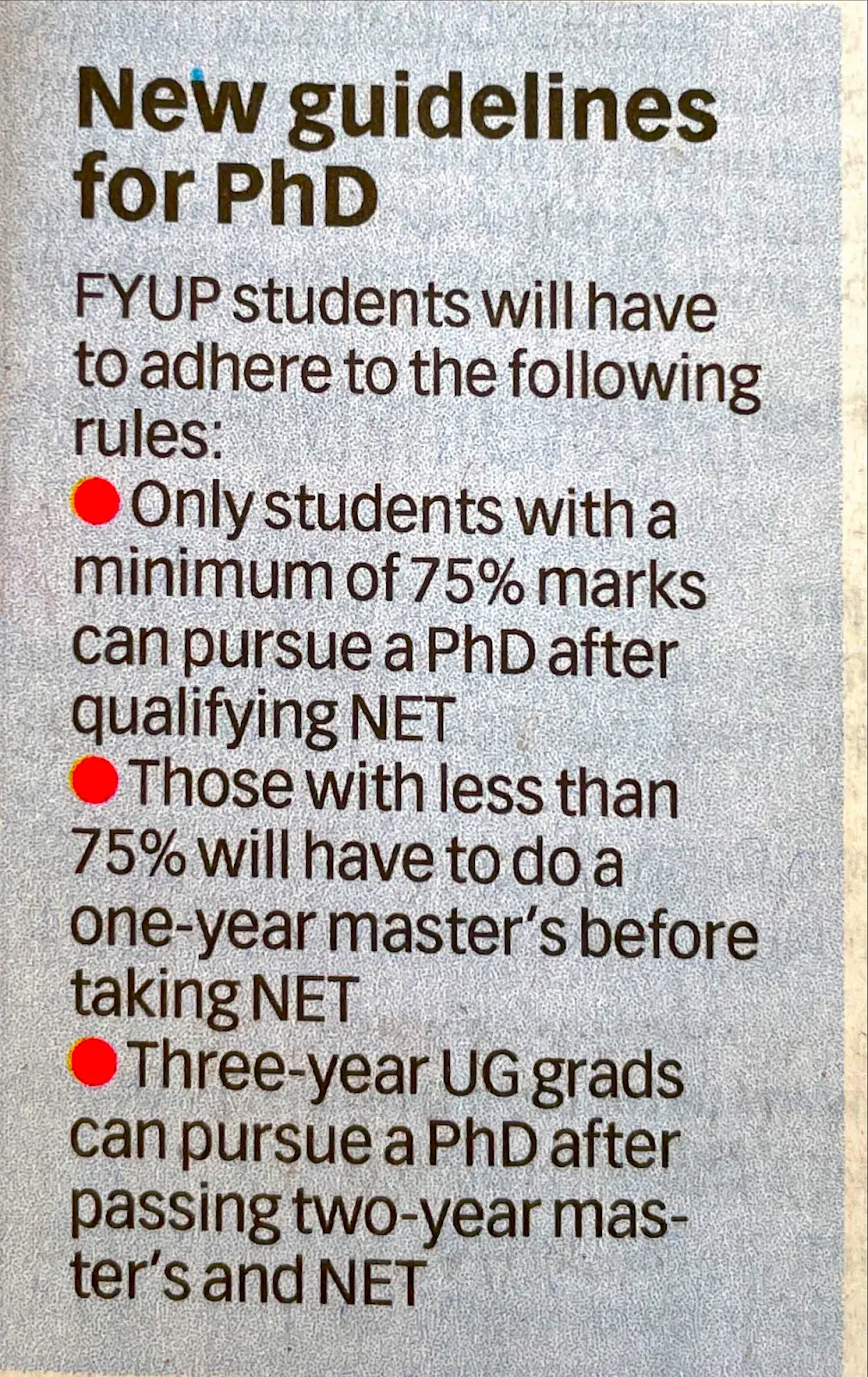Context
Recently, The University Grants Commission (UGC) released new guidelines for PhD admissions following expert committee recommendations.
About New PhD Guidelines
These new PhD guidelines, applicable from the academic session 2024–25,
- Transition to Common Entrance Test:
- PhD admissions will now rely on the National Eligibility Test (NET).
- Categorization of NET Candidates: These guidelines will classify NET candidates into three categories from June 2024 onwards.
 First would be those who are eligible for
First would be those who are eligible for
- Admission to a PhD programme with JRF and
- Appointment as an assistant professor.
- Second would be those candidates who are eligible for
- Admission to a PhD programme without JRF and
- Appointment as an assistant professor.
- Third would be those candidates who are eligible for admission to a PhD programme only without getting selected for the JRF or being eligible for appointment as an assistant professor.
- Potential Motive Behind News PhD Guidelines :
- To pursue the PhD in any subject irrespective of the subjects of their undergraduate degree.
- The provision has been introduced to strengthen the research ecosystem by increasing the pool of PhD candidates.
- Moreover, the UGC aims to shatter the perception that a PhD is an ‘elite qualification’.
Enroll now for UPSC Online Course
UGC’s Vision behind New PhD Guidelines
Unleashing the Full Potential of Graduates into the Mainstream
- Expansion of Eligibility Criteria:
- UGC’s decision allows graduates with four-year undergraduate degrees to appear for the National Eligibility Test (NET), thereby broadening the pool of prospective PhD candidates.
- Previously, eligibility for both lectureship and PhD programs required a Master’s degree, leading to a more restricted candidate base.
- Aim to Dismantle Perceptions of Elitism:
- UGC aims to dismantle the perception of PhD as an “elite qualification” by expanding eligibility criteria.
- Emphasis shifts towards making higher education more accessible and inclusive..
- Financial Considerations:
-
- The UGC aims to reduce financial burdens on students by replacing multiple entrance tests with a single common test.
- This shift seeks to alleviate expenses related to application fees, travel, and boarding, especially for students from rural or semi-urban areas.
Concerns Raised with New PhD Guidelines
- Standardization vs. Autonomy :
- Debate centers on balancing standardization and university autonomy in academia.
- The move towards a single common entrance test aims to streamline admissions but raises concerns about eroding institutional autonomy.
- Importance of Rigorous Preparation:
- Concerns arise regarding the dilution of standards, particularly in conceptual and methodological preparedness.
- Elimination of MPhil programs and the reduced emphasis on postgraduate degrees raise questions about maintaining rigor in research.
- Lack of long-form writing assessments in the NET exam raises doubts about its effectiveness.
- Financial Implications and Equity Concerns :
- While the UGC aims to reduce financial burdens on students, concerns arise about exacerbating socio-economic disparities.
- The rise of the coaching industry around NET preparation raises questions about equitable access to higher education.
- Global Best Practices vs. Local Realities :
- Critics highlight a gap between the UGC’s approach and global standards in PhD admissions.
- International practices emphasize holistic assessments, including research proposals, CVs, and statements of purpose, which are absent in the UGC’s guidelines.
- Potential for Further “Elitisation” of Higher Education:
-
- If undergraduate degrees suffice for PhD research, it could lead to further “elitisation” of higher education.
- Only students with existing linguistic and academic capital may pursue research, exacerbating existing inequalities.
Way Forward
- Call for Publicly-Funded Research Institutes:
- The need for more publicly-funded research institutes with better infrastructure and increased fellowships is emphasized.
- Such initiatives could enhance opportunities for students while maintaining standards of rigor and mentorship.
- Focus on the Role of Mentorship and Preparation:
- Adequate mentoring and preparation are crucial for students transitioning from undergraduate to PhD levels.
- Therefore, The importance of sustained mentoring and preparation periods should be taken into account for ensuring the quality of research.
Enroll now for UPSC Online Classes
Conclusion
While UGC’s new PhD guidelines aim to democratize access to higher education, concerns persist regarding the potential impact on the elite status of universities and the maintenance of research standards. Therefore, Balancing inclusivity with rigor and ensuring adequate mentorship is crucial for fostering a vibrant and equitable research ecosystem.
Also Read: Micro Credentials: A Next Chapter In Indian Higher Education
![]() 4 May 2024
4 May 2024
 First would be those who are eligible for
First would be those who are eligible for